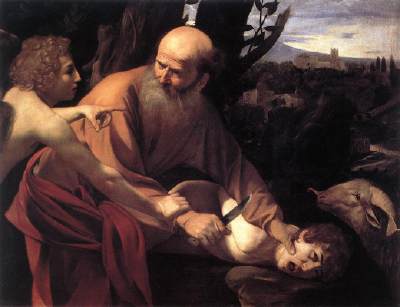God Hounds Us
The Fourth Sunday of Lent
Today’s Readings: 2 Ch. 36:14-16,19-23; Ps. 137; Eph. 2:4-10; Jn. 3:14-21
Elvis used to sing “You ain’t nothin’ but a hound dog,” and the song complained that “you ain’t never caught a rabbit.” Not a very good hunter, I guess.
Have you ever seen a hound dog going after… well, hounding… its prey? Back in the days before Maggie, my family used to have coon dogs — mostly bluetick hounds —
 and they’d work a trail all night if you’d let them. And when their “music” changed — their special baying — you knew they had a raccoon treed. In fact, those dogs would wrap their paws around the tree and try to shimmy up to get to the coon. Coon hunters call that “swallowing the tree,” and you want that in a dog.
and they’d work a trail all night if you’d let them. And when their “music” changed — their special baying — you knew they had a raccoon treed. In fact, those dogs would wrap their paws around the tree and try to shimmy up to get to the coon. Coon hunters call that “swallowing the tree,” and you want that in a dog.Then we had Martina, the basset hound. She broke into the chicken coop one day, grabbed a poor bird and strutted through the yard while a couple of us humans tried to catch her. No way was she going to let it go.
If you know hounds, then you probably won’t be surprised to hear that one of the best known religious poems in the English language is called “The Hound of Heaven.” It was written by Francis Thompson, who tried to run away from God. He compares God to a hound dog tracking and chasing a soul. The poem is the story of Thompson’s own life.
As a boy, Francis wanted to become a priest, but he was thrown out of seminary for laziness. His father, who was a doctor, managed to get him into medical school, but he flunked out there, too. Along the way, he became an opium addict, and the drug just about ruined his life. He became a beggar, wandering through the slums. He eked out a miserable living by shining shoes, selling matches, and doing other odd jobs. Through the kindness of a poor girl, Thompson met Mr. and Mrs. Wilfred Meynell, who recognized his talent and inner goodness. They helped him get caught by God’s love.
How he tried to run away from God… how God “hounded” him… how divine love finally caught him — these are the themes of his moving poem.
In today’s very beautiful gospel, St. John gives us outstanding proof of God’s love for us in the 27 well-known words of John 3:16: “For God so loved the world that He gave His only Son, so that everyone who believes in him might not perish but might have eternal life.” Our heavenly Father demonstrated his love for each of us by sending his precious Son to win us back. Like Francis Thompson, souls run away from God. Like a hound pursuing a rabbit or a fox or a coon or even a chicken, God runs after every soul. But unlike the hound thinking of his dinner, God wants to save that soul, not destroy it.
How can we get some inkling of how much The Hound of Heaven loves us? St. Paul tells the Ephesians to think about “the breadth and length and height and depth” of God’s love for man (Eph 3:18).
God’s love for us is broad. It reaches to every human being in creation: people of every race, nationality, class, gender and state in life, sexual orientation, ability or disability, age, culture, economic status, religious preference… to people of every faith and belief, including those with no faith or those who reject God… to saints and the worst sinners… to the fervent, the lukewarm and even the ice-cold. God wants everyone to share in his goodness and experience his love.
God’s love for us is long. As Jeremiah the prophet writes, “I have loved you with an everlasting love” (Jer 21:3). Before the world began, God knew you and loved you. His love stretches from eternity to eternity. He knew all about you and wanted you even before Adam and Eve were placed in the Garden of Eden… and his love will never end.
God’s love for us is high. It reaches from the throne of Almighty God in the highest heavens. We see the height of his love in his gifts to us. What could be more magnificent than God sharing his very life with us in the sacraments? What love could be higher than giving his own all-good, all-loving, all-holy Son to us as food in Holy Communion?
And finally, God’s love for us is deep. He humbled himself by coming down from the heights of heaven to the lowly stable at Bethlehem… to the slums and jungles and deserts… to the least of men… to the shame of a cross… to the depths of a tomb. How far would God go to win us over? An infinite distance…
Hopefully we will realize, as Nicodemus did — as Francis Thompson did — and as all the saints did — that God will gladly and eagerly hound us and chase our souls to the ends of the earth. And once we do realize this, then confidently we will try to return that love and grow in love.
So many of us carry terrible burdens and pain in this life. Some of us try to run away or dull the senses — but somehow, the misery always seems to tag along. It often takes a long time for God’s love to penetrate our thick skulls, because we tend to fight him and dodge him every step of the way.
But how wonderful to let our holy desires come out, so we can live as children of God, trusting Jesus every step of the way. With Jesus, we can begin taking baby steps of faith towards spiritual adulthood and maturity. No matter what our age, when we believe in the message of Jesus, we will always find Jesus nearby, giving us guidance and strength for each day.
During this holy and privileged season of Lent, may we all remember that we are being pursued by God — hounded by him — by the One who loves us freely and unconditionally and beyond our wildest imagining. Let’s stop running away! Instead, pray that he catches us and makes us his own.



